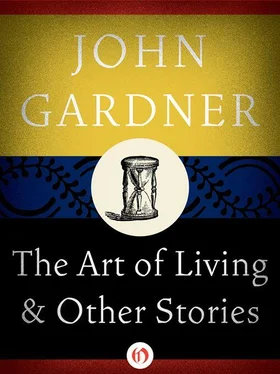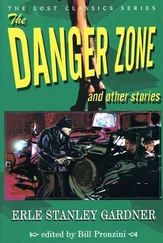John Gardner - The Art of Living - And Other Stories
Здесь есть возможность читать онлайн «John Gardner - The Art of Living - And Other Stories» весь текст электронной книги совершенно бесплатно (целиком полную версию без сокращений). В некоторых случаях можно слушать аудио, скачать через торрент в формате fb2 и присутствует краткое содержание. Год выпуска: 2010, Издательство: Open Road Media, Жанр: Современная проза, на английском языке. Описание произведения, (предисловие) а так же отзывы посетителей доступны на портале библиотеки ЛибКат.
- Название:The Art of Living: And Other Stories
- Автор:
- Издательство:Open Road Media
- Жанр:
- Год:2010
- ISBN:нет данных
- Рейтинг книги:4 / 5. Голосов: 1
-
Избранное:Добавить в избранное
- Отзывы:
-
Ваша оценка:
- 80
- 1
- 2
- 3
- 4
- 5
The Art of Living: And Other Stories: краткое содержание, описание и аннотация
Предлагаем к чтению аннотацию, описание, краткое содержание или предисловие (зависит от того, что написал сам автор книги «The Art of Living: And Other Stories»). Если вы не нашли необходимую информацию о книге — напишите в комментариях, мы постараемся отыскать её.
The Art of Living: And Other Stories — читать онлайн бесплатно полную книгу (весь текст) целиком
Ниже представлен текст книги, разбитый по страницам. Система сохранения места последней прочитанной страницы, позволяет с удобством читать онлайн бесплатно книгу «The Art of Living: And Other Stories», без необходимости каждый раз заново искать на чём Вы остановились. Поставьте закладку, и сможете в любой момент перейти на страницу, на которой закончили чтение.
Интервал:
Закладка:
Though he was not ordinarily a man who smoked, he would sometimes sit up all night now, or move restlessly, hurriedly, from room to room, chain-smoking Lucky Strikes. Or he would ride away on his huge, darkly thundering Harley-Davidson 80, trying to forget, morbidly dwelling on what he’d meant to put behind him — how David had once laughed, cake in his fists; how he’d once patched a chair with precocious skill — or Dale Hawthorne would think, for the hundredth time, about suicide, hunting in mixed fear and anger for some reason not to miss the next turn, fly off to the right of the next iron bridge onto the moonlit gray rocks and black water below — discovering, invariably, no reason but the damage his suicide would do to his wife and the children remaining.
Sometimes he would forget for a while by abandoning reason and responsibility for love affairs. Jack’s father was at this time still young, still handsome, well-known for the poetry he recited at local churches or for English classes or meetings of the Grange — recited, to loud applause (he had poems of all kinds, both serious and comic), for thrashing crews, old men at the V.A. Hospital, even the tough, flint-eyed orphans at the Children’s Home. He was a celebrity, in fact, as much Romantic poet-hero as his time and western New York State could afford — and beyond all that, he was now so full of pain and unassuageable guilt that women’s hearts flew to him unbidden. He became, with all his soul and without cynical intent — though fleeing all law, or what he’d once thought law — a hunter of women, trading off his sorrow for the sorrows of wearied, unfulfilled country wives. At times he would be gone from the farm for days, abandoning the work to Jack and whoever was available to help — some neighbor or older cousin or one of Jack’s uncles. No one complained, at least not openly. A stranger might have condemned him, but no one in the family did, certainly not Jack, not even Jack’s mother, though her sorrow was increased. Dale Hawthorne had always been, before the accident, a faithful man, one of the most fair-minded, genial farmers in the country. No one asked that, changed as he was, he do more, for the moment, than survive.
As for Jack’s mother, though she’d been, before the accident, a cheerful woman — one who laughed often and loved telling stories, sometimes sang anthems in bandanna and blackface before her husband recited poems — she cried now, nights, and did only as much as she had strength to do — so sapped by grief that she could barely move her arms. She comforted Jack and his sister, Phoebe — herself as well — by embracing them vehemently whenever new waves of guilt swept in, by constant reassurance and extravagant praise, frequent mention of how proud some relative would be — once, for instance, over a drawing of his sister’s, “Oh, Phoebe, if only your great-aunt Lucy could see this!” Great-aunt Lucy had been famous, among the family and friends, for her paintings of families of lions. And Jack’s mother forced on his sister and himself comforts more permanent: piano and, for Jack, French-horn lessons, school and church activities, above all an endless, exhausting ritual of chores. Because she had, at thirty-four, considerable strength of character — except that, these days, she was always eating — and because, also, she was a woman of strong religious faith, a woman who, in her years of church work and teaching at the high school, had made scores of close, for the most part equally religious, friends, with whom she regularly corresponded, her letters, then theirs, half filling the mailbox at the foot of the hill and cluttering every table, desk, and niche in the large old house — friends who now frequently visited or phoned — she was able to move step by step past disaster and in the end keep her family from wreck. She said very little to her children about her troubles. In fact, except for the crying behind her closed door, she kept her feelings strictly secret.
But for all his mother and her friends could do for him — for all his father’s older brothers could do, or, when he was there, his father himself — the damage to young Jack Hawthorne took a long while healing. Working the farm, ploughing, cultipacking, disking, dragging, he had plenty of time to think — plenty of time for the accident to replay, with the solidity of real rime repeated, in his mind, his whole body flinching from the image as it came, his voice leaping up independent of him, as if a shout could perhaps drive the memory back into its cave. Maneuvering the tractor over sloping, rocky fields, dust whorling out like smoke behind him or, when he turned into the wind, falling like soot until his skin was black and his hair as thick and stiff as old clothes in an attic — the circles of foothills every day turning greener, the late-spring wind flowing endless and sweet with the smell of coming rain — he had all the time in the world to cry and swear bitterly at himself, standing up to drive, as his father often did, Jack’s sore hands clamped right to the steering wheel, his shoes unsteady on the bucking axlebeam — for stones lay everywhere, yellowed in the sunlight, a field of misshapen skulls. He’d never loved his brother, he raged out loud, never loved anyone as well as he should have. He was incapable of love, he told himself, striking the steering wheel. He was inherently bad, a spiritual defective. He was evil.
So he raged and grew increasingly ashamed of his raging, reminded by the lengthening shadows across the field of the theatricality in all he did, his most terrible sorrow mere sorrow on a stage, the very thunderclaps above — dark blue, rushing sky, birds crazily wheeling — mere opera set, proper lighting for his rant. At once he would hush himself, lower his rear end to the tractor seat, lock every muscle to the stillness of a statue, and drive on, solitary, blinded by tears; yet even now it was theater, not life — mere ghastly posturing, as in that story of his father’s, how Lord Byron once tried to get Shelley’s skull to make a drinking cup. Tears no longer came, though the storm went on building. Jack rode on, alone with the indifferent, murderous machinery in the widening ten-acre field.
When the storm at last hit, he’d been driven up the lane like a dog in flight, lashed by gusty rain, chased across the tracks to the tractor shed and from there to the kitchen, full of food smells from his mother’s work and Phoebe’s, sometimes the work of two or three friends who’d stopped by to look in on the family. Jack kept aloof, repelled by their bright, melodious chatter and absentminded humming, indignant at their pretense that all was well. “My, how you’ve grown!” the old friend or fellow teacher from high school would say, and to his mother, “My, what big hands he has, Betty!” He would glare at his little sister, Phoebe, his sole ally, already half traitor — she would bite her lips, squinting, concentrating harder on the mixing bowl and beaters; she was forever making cakes — and he would retreat as soon as possible to the evening chores.
He had always told himself stories to pass the time when driving the tractor, endlessly looping back and forth, around and around, fitting the land for spring planting. He told them to himself aloud, taking all parts in the dialogue, gesturing, making faces, discarding dignity, here where no one could see or overhear him, half a mile from the nearest house. Once all his stories had been of sexual conquest or of heroic battle with escaped convicts from the Attica Prison or kidnappers who, unbeknownst to anyone, had built a small shack where they kept their captives, female and beautiful, in the lush, swampy woods beside the field. Now, after the accident, his subject matter changed. His fantasies came to be all of self-sacrifice, pitiful stories in which he redeemed his life by throwing it away to save others more worthwhile. To friends and officials of his fantasy, especially to heroines — a girl named Margaret, at school, or his cousin Linda — he would confess his worthlessness at painful length, naming all his faults, granting himself no quarter. For a time this helped, but the lie was too obvious, the manipulation of shame to buy love, and in the end despair bled all color from his fantasies. The foulness of his nature became clearer and clearer in his mind until, like his father, he began to toy — dully but in morbid earnest now — with the idea of suicide. His chest would fill with anguish, as if he were dreaming some nightmare wide awake, or bleeding internally, and his arms and legs would grow shaky with weakness, until he had to stop and get down from the tractor and sit for a few minutes, his eyes fixed on some comforting object, for instance a dark, smooth stone.
Читать дальшеИнтервал:
Закладка:
Похожие книги на «The Art of Living: And Other Stories»
Представляем Вашему вниманию похожие книги на «The Art of Living: And Other Stories» списком для выбора. Мы отобрали схожую по названию и смыслу литературу в надежде предоставить читателям больше вариантов отыскать новые, интересные, ещё непрочитанные произведения.
Обсуждение, отзывы о книге «The Art of Living: And Other Stories» и просто собственные мнения читателей. Оставьте ваши комментарии, напишите, что Вы думаете о произведении, его смысле или главных героях. Укажите что конкретно понравилось, а что нет, и почему Вы так считаете.












